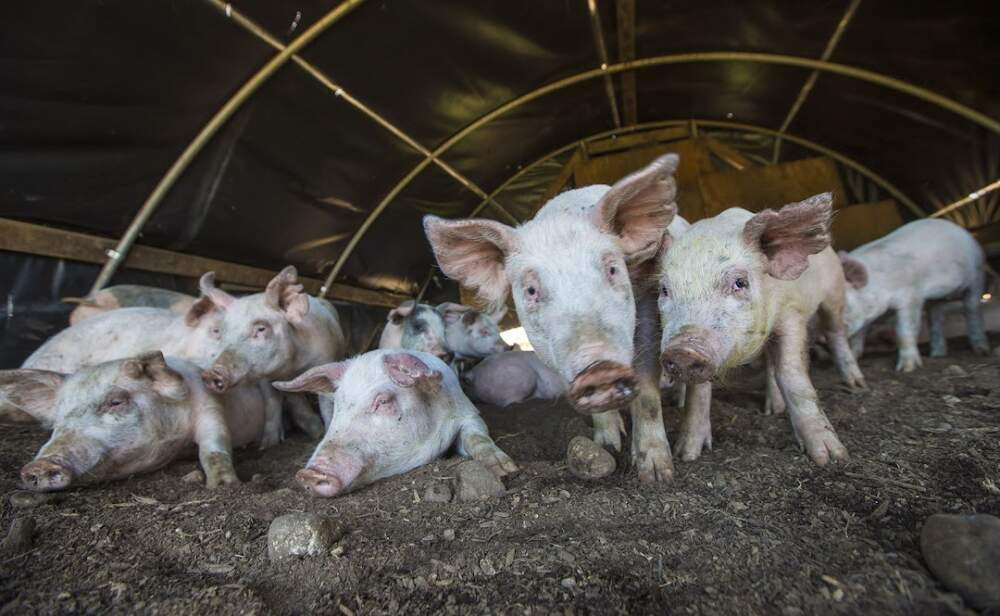Advertisement
Boston's Morning Newsletter
What to know about the new pork rules in Massachusetts

Editor's Note: This is an excerpt from WBUR's daily morning newsletter, WBUR Today. If you like what you read and want it in your inbox, sign up here.
Today is unofficial callout sick day. Whether you’re sneaking in a trip to the beach before the rain returns this weekend or actually sick at home scrolling for more details about the new Boston-based reboot of “Frasier,” here’s what to know today:
Nearly seven years after Massachusetts voters overwhelmingly backed a ballot measure to require more space for farm animals raised for food, pigs are finally getting their day. Beginning today, pork products from pigs raised in gestation crates are prohibited in Massachusetts, as is the use of the tightly confining cages by local farms. The rules are taking effect despite a pending lawsuit by national pork producers arguing against their constitutionality. But for now, rules are rules.
- What do the rules apply to: The new regulations require that most uncooked pork sold in Massachusetts — bacon, ham, ribs, cutlets, etc. — come from pigs that were raised in pens with enough space to freely turn around, lie down and stand up. That effectively bans the use of gestation crates, not only by farms in Massachusetts but also by out-of-state producers selling pork meat in the state.
- What they don’t apply to: The regulations do not apply to sausage or hot dogs, or other products not considered “whole pork meat.”
- The local angle: The law isn’t expected to have a major impact on local farms. Karen Schwalbe, the head of Massachusetts Farm Bureau Federation, told New England Public Media’s Alden Bourne that the kind of confinement the law prohibits is “not used by small-scale farmers like we have in Massachusetts.”
- The big picture: Bacon fans could still see impacts at the grocery store, since most meat sold in Massachusetts comes from out of state. Industry analysts have estimated that less than 4% of pork in the U.S. meets the new standards. So there are some concerns that the rules could result in price increases or supply shortages, as The Boston Globe reported earlier this spring.
- What took so long? The original 2016 animal welfare ballot measure gave officials until 2022 to implement the law. While the rules for eggs and veal already took effect, the pork rules were repeatedly delayed — first by lawmakers worried about a shortage and then by a lawsuit against similar rules in California.
- What’s next: We’re still waiting to see how the new lawsuit — brought by a group of midwest pork producers — against Massachusetts’ law plays out. The group argues that federal law supersedes state laws, though a similar argument in the California cased proved unsuccessful. A hearing is scheduled for Sept. 6.
UMass Memorial Health is trying to prepare patients for the planned closure of the birthing center at Leominster Hospital. The maternity ward is slated to close next month, because hospital leaders say it doesn’t get enough business to keep it open. However, critics say the closure will force many pregnant patients in north central Massachusetts to travel at least 20 miles to give birth.
- What the hospital is doing: Leaders are offering to provide transportation to those who need it to the nearest hospitals, like UMass Memorial Medical Center in Worcester. The option would only be available for patients giving birth, not for prenatal and postpartum appointments. Read more about the plan here.
Logan Airport is getting $45 million from the federal government to redesign some of its taxiways. The goal to reduce the risk of collisions between planes on the ground, as well as close calls like the one that occurred last week between a Spirit and American Airlines plane.
- Logan isn’t the only local airport trying to cut down on close calls: Martha’s Vineyard Airport and Worcester Regional Airport are both working with federal officials on runway safety next month.
Boston has a new school committee member: Mayor Michelle Wu appointed Chantal Lima Barbosa yesterday, the first Cape Verdean woman to serve on the board. Lima Barbosa is replacing former school committee member Lorena Lopera, who resigned earlier this year. She’ll serve at least through the end of Lopera’s term into 2024.
P.S.— Do you have some space in your post-Labor Day schedule? We have two community listening sessions scheduled next month: Sept. 5 in Chelsea and Sept. 9 in Lawrence. The small, off-the-record conversations are a chance for us to hear directly from the community about the the issues that are top of your mind. (There will also be refreshments!) RSVP at the links above.
